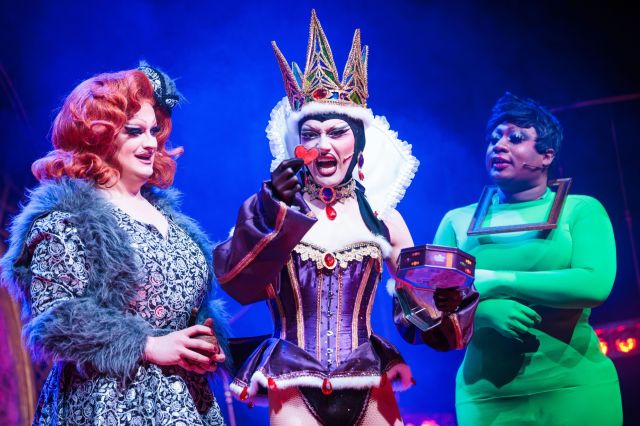This year the Pulse Fringe Festival in Ipswich has grown in maturity and has moved away from being a springboard and dry-run for Edinburgh.
Many of the performances showcased this year have either won awards – like the Bryony Kimmings piece that opened the festival – or are début pieces from promising and fresh new companies.

One of the latter, which proved to be an absolute delight, was Our Fathers from Babakas. In a piece devised and written by the company, it challenged the role of fatherhood through the story of the dilemma that gay Mike faces about becoming a surrogate father for his dead dad's friend's daughter.
It literally involves the audience (literally) as Paschou questions various of its members. But the audience is also engaged through a variety of other media, such as projection onto the stage background and shadow puppetry, dance, movement and music, along with a playful, intelligent script that is not self-important. This is a genuinely thought-provoking and moving piece of theatre; probably Pulse's best this year.
The relationship between father and child has an echo in the relationship that Kimmings has with her niece – the inspiration for Credible Likeable Superstar Role Model. It has a dark but magical tone and is performed by Kimmings and her tweenage niece, Taylor.
Its inspiration comes from time spent one summer with nine-year-old Taylor. During this time Kimmings realised that the role models open to girls of that age were the Youtube videos of Miley Cyrus and Katy Perry, and that fame rather than more noble aspirations were what were being put in front of young girls.
It is a clever and subtle piece that weaves together a variety of performance styles ranging through dance, mime and lecture to demonstrate "all the rage" that Kimmings feels at this situation. Particular highlights are when they dance to a Katy Perry song and you realise how sexualised a popular pop song is that nine-year-olds could easily view on Youtube.
However, rather than festering in frustration, Bryony creates the character of Catherine Bennett, who is a credible likeable superstar role model developed from the insights that her niece has on what would be appealing to nine-year-old girls.
At this point, the piece takes an uplifting but still unsettling direction as the audience is transported back to being an assembly in primary school and learning the Catherine Bennett dances. This is a witty and refreshing piece which makes an interesting departure from Kimmings' previous, somewhat narcissistic work.
The impact of Alzheimer's on Julie McNamara's mother is also the occasion for another moving piece of theatre, Let Me Stay from Vital Xposure. In a simple staging with a collection of boxes on to which footage of McNamara's mother is projected, McNamara cleverly creates a blend of theatrical monologue and story-telling regarding Shirley McNamara's descent into Alzheimer's.
However, rather than seeing this as woeful, McNamara sees it as her mother having an opportunity to live her days with a sense of glee. This is a very subtle performance that shows skill both as a playwright and actor.
Through the application of a head-scarf or the putting-on of red shoes and adopting her mother's mannerisms and accents, McNamara magically becomes her mother. The beauty of this piece is that McNamara weaves the role of her mother into McNamara's telling her story seamlessly and she avoids the didactic nature of some other performance artists.
Rather than love between the generations, Every Day's début production The Love Project is an intelligent piece which applies the concept of verbatim theatre (where following interviews with subjects every detail of the interviewee's answer is imitated) to a subject that many of us can relate to – romantic love.
Four actors sit on a variety of chairs along with a sofa and coffee table. This piece is very reminiscent of the Nick Park Aardman Animations' Creature Comforts. The actors have the same kind of elastic expressions and accuracy in imitating their subject's accents and the strong characterisation and script make this a compelling piece.
Particular credit must go to Dale and Manley, who perform two sets of couples: a couple of shy teenagers and also a more mature couple who have been married for decades. Despite no change in make-up or costume, their characterisations are mesmerising. While interest sags somewhat midway through the performance, this is a strong and interesting début production for this theatre company.
Also staged in the New Wolsey Studio with a delightful set of vintage electric lamps illuminating the studio is an initially baffling narrative delivered by Annie Siddons and accompanied by the instrumentalist Marcus Hamblett called Raymondo.
The story about two brothers who manage to escape the confines of a cruel mother who locked them in the basement is beautifully delivered by Siddons whose excellently crafted lyrics paint vivid images in your mind and leave you savouring her wit.
Another dramatic piece on growing up is delivered by the New Wolsey Young Associates. Tom Chamberlain, Sam Rhodes, Gemma Raw and Jack Tricker delivered an action-packed hour of physical theatre, comedy and confessional in Frequently Asked Questions. This collective shows a particularly high level of professional maturity beyond their years, both in the script which they helped devise and its delivery.
In a less action-packed but still entertaining performance, Francesca Millican-Slater gives a performance lecture on the history of the first flat that she lived in on her own up in Birmingham. Millican-Slater is an engaging and warm performer whose delivery has a Benjamin Zephaniah-like fluency resulting in a warm and interesting piece about how the history of her local area changed over the last century. It's called The Forensics of a Flat.
Among Pulse's oddities this year Pulse was American Boy, where Hetain Patel delivered both vocal and physical impressions of various Hollywood characters ranging from Morgan Freeman to Spiderman. Patel's skill and physical and vocal mimicry is to be praised; however, further reflection and research on Patel's background is necessary to fully understand that he is making commentary on how identity is shaped by the influence of others.
Nigel Barrett and Louise Mari's A Conversation is similarly disorientating. Inspired by an etiquette guide written in the late 1920s, Barrett delivers lines from this how-to manual for a variety of situations; Mari provides voiceovers as the stage is darkened between scenes.
Many of the audience members found this funny and some of the now politically incorrect (though not for the 1920s) dialogue was poignant, but overall this is a very confusing and disorientating piece.












